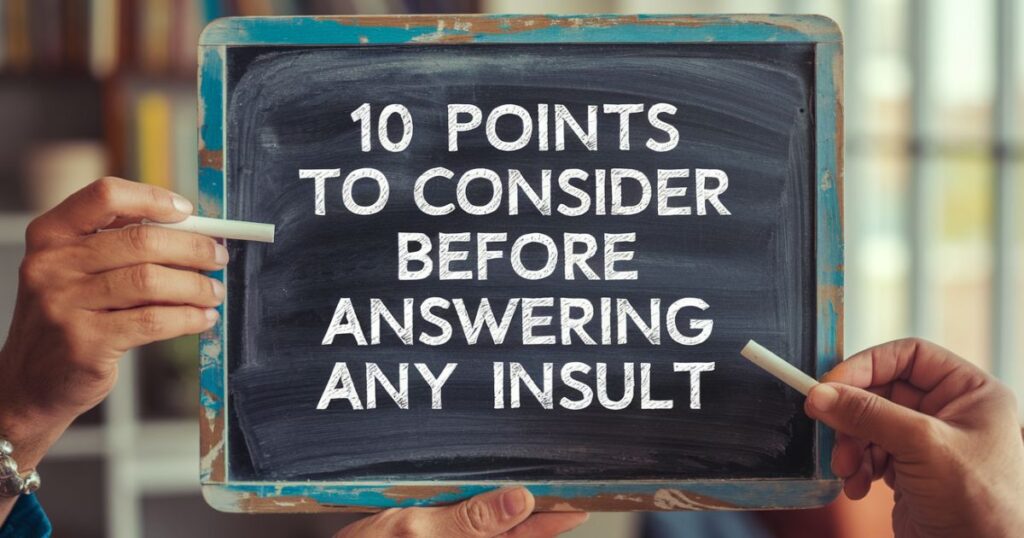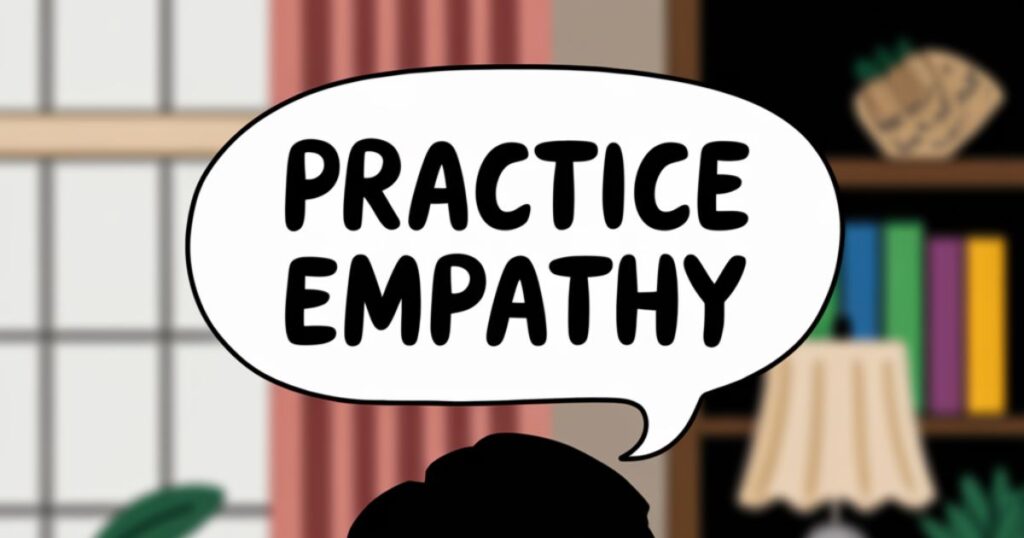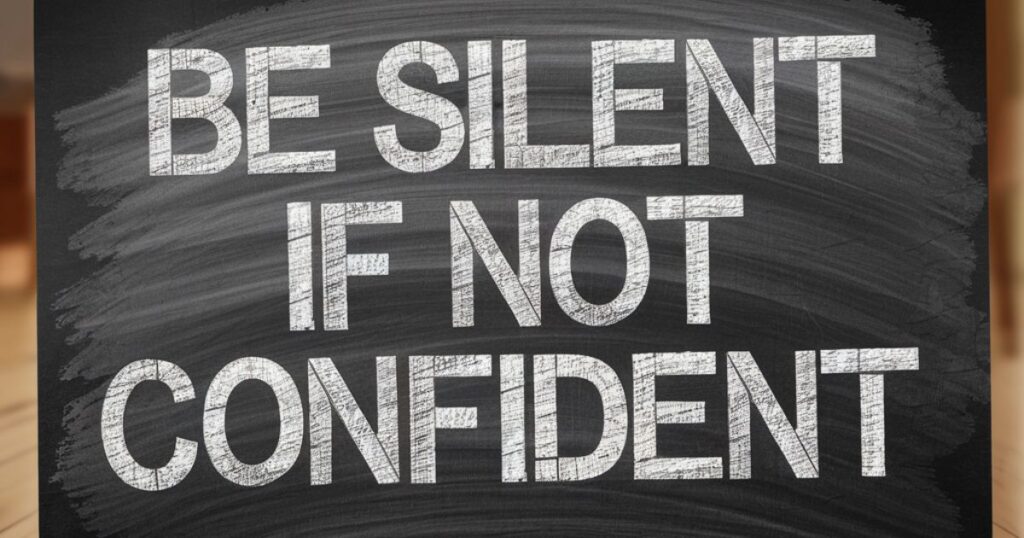Getting hit with hurtful words can sting, but your response doesn’t have to. Replies to the insult are more than comebacks, they’re your secret weapon for staying composed and confident. The right reply can calm the storm, protect your dignity, and even turn negativity into an opportunity for grace. It’s not about snapping back but responding smartly and showing strength without aggression.
Words can wound, but they can also heal. With thoughtful replies to the insult, you control the narrative. Stay cool, use precise words, and make every reply count. A clever response isn’t just self-defense; it’s a reflection of your self-respect. Show the world that insults don’t define you, they only reveal your ability to rise above.
Savage Replies to the Insult | 42 Best Phrases to Use
- “I didn’t realize your opinion mattered until now,oh wait, it still doesn’t, but thanks for sharing anyway!”
- “Your insult reminds me of your logic,weak, unoriginal, and completely irrelevant. Do better if you want attention next time.”
- “Wow, that was such a creative attempt to offend me. Let me know when you learn how to actually succeed.”
- “Oh, bless your heart! It must be exhausting to carry all that negativity around everywhere you go every day.”
- “Thanks for your input, but I stopped taking advice from people with zero credibility a long, long time ago.”
- “Your words would sting if I cared about your opinion. Thankfully, I don’t, so it’s just background noise to me.”
- “I’d explain why your argument fails, but I don’t think you’d understand even the simplest explanation. Don’t bother asking.”
- “Your insults are like your personality,flat, predictable, and completely lacking any real depth. Try harder next time, maybe?”
- “Oh, was that supposed to hurt? Sorry, I was too busy ignoring irrelevant people to actually notice your weak attempt.”
- “You bring joy to so many people, especially when you finally decide to leave the room. It’s truly a blessing.”
- “Wow, that was an interesting take. Not a correct one, of course, but entertaining nonetheless. I’ll give you credit.”
- “Your negativity is so consistent that it’s almost impressive. Too bad consistency isn’t enough to make it actually meaningful.”
- “Oh, are we sharing opinions now? Let me know when yours starts carrying any actual weight or significance whatsoever, okay?”
- “You’ve got such a great sense of humor,it’s a shame none of your jokes seem to land properly, though.”
- “If ignorance is bliss, you must be the happiest person alive. Congratulations on achieving such an impressive emotional state!”
- “I’d agree with you, but then we’d both be wrong, and I have no interest in that happening today.”
- “Your insults are like dollar store items,cheap, easily replaceable, and not worth spending even a second of my energy on.”
- “You must really enjoy embarrassing yourself publicly, considering how committed you are to making completely invalid points so confidently.”
- “I’m always amazed at how irrelevant your arguments are. It’s almost as if you try to be this consistently unimportant.”
- “Your attempts at humor are almost as awkward as your attempts to argue logically. Practice more before trying again, please.”
- “Oh, was that supposed to hurt my feelings? Sorry, I think I left my sensitivity back in elementary school recess.”
- “Thank you for proving once again that silence truly is golden. Please continue demonstrating that wisdom by not speaking anymore.”
- “I admire your confidence, even though it’s clearly misplaced. It must take real effort to be wrong with such certainty.”
- “You really remind me of a speed bump,unnecessary, annoying, and serving no purpose other than to slow down progress.”
- “Your attempts to offend me are like a dull knife,they might scratch the surface, but they’ll never really cut.”
- “Interesting perspective! It’s wrong, obviously, but still mildly amusing to see you try so hard to make it convincing.”
- “Oh, I didn’t realize we were playing ‘who can embarrass themselves the fastest.’ You’re clearly winning by a wide margin.”
- “Your words have the power of a butterfly landing on a brick wall,pretty harmless and barely noticeable to most people.”
- “If there were an award for pointless insults, you’d win first place. Congratulations on being utterly irrelevant to this conversation.”
- “Your comments are like a broken clock,they’re wrong most of the time, but they might accidentally make sense someday. Maybe.”
- “You must think your words carry weight, but they’re as light as a feather and about as impactful as one.”
- “Was that supposed to be an insult? Sorry, I’m too busy being unbothered by your words to actually feel offended.”
- “Your attempt to insult me is like a pencil without lead,pointless, ineffective, and not worth my attention at all.”
- “If you put as much effort into being kind as you do into being petty, you’d be unstoppable, truly.”
- “You’ve mastered the art of saying a lot without actually making sense. Congratulations on such a unique and useless skill!”
- “Your insults are like expired coupons,completely useless and incapable of having any meaningful effect on anyone who encounters them.”
- “If ignorance were an Olympic sport, you’d take home the gold medal every time. Impressive dedication to mediocrity, truly.”
- “Oh, your words sting about as much as a mosquito bite, annoying for a moment, but quickly forgotten and irrelevant.”
- “It’s amazing how confidently wrong you can be. It must take real talent to miss the mark so consistently.”
- “Your negativity is like rain at a picnic,unwelcome, inconvenient, and ultimately unable to ruin anything truly important in life.”
- “That’s a creative insult. It’s too bad it lacks originality, logic, and any actual power to affect me whatsoever.”
- “You keep proving that your words are like paper airplanes,light, flimsy, and incapable of causing any real damage to anyone.”
10 Points to Consider Before Answering Any Insult

Before replying to an insult, take a moment to pause and reflect. Understand the intent behind their words and avoid reacting emotionally. Staying calm and composed ensures your dignity remains intact. A thoughtful response can diffuse negativity and show emotional intelligence.
1. Pause & Take a Breath
“Replies to the insult” should never be rushed. When insulted, pause and take a deep breath before responding. This gives you control over emotions and helps you think clearly. A calm mind leads to better “Replies to insult.” Don’t let anger guide your words; take your time and respond thoughtfully.
Taking a moment to breathe prevents impulsive reactions. “Replies to the insult” delivered in a calm tone carry more weight. Stay composed, and you’ll handle the situation gracefully. A short pause can make your “Replies to insult” more effective and meaningful.
2. Search for the Intent
Understanding the reason behind the insult matters. Analyze the intent before crafting your “Replies to the insult.” Are they trying to provoke, joke, or genuinely criticize? Knowing the intent ensures your response fits the situation.
- Understand the Motivation: “Replies to insult” should begin with understanding why the insult was made. Are they angry, jealous, or joking? Knowing their motivation shapes an appropriate and effective response.
- Focus on Their Emotion: Before crafting “Replies to insult,” identify the emotion behind their words. Are they upset or trying to hurt you? This insight helps you choose your response wisely.
- Separate Words from Intent
Sometimes, words hurt more than intended. “Replies to insult” require recognizing whether their intent was genuinely harmful or a poorly expressed point of view. Clarity ensures a balanced reply. - Recognize Personal Triggers: “Replies to insult” become easier when you know your triggers. Identify if their comment was aimed to provoke or if it unintentionally hit a sensitive area for you.
- Assess the Situation: Before delivering “Replies to insult,” analyze the context. Are they seeking attention, venting frustration, or just being rude? Responding appropriately depends on understanding the bigger picture.
- Avoid Assumptions: Don’t jump to conclusions. Effective “Replies to insult” come from understanding their real intent, not assuming it. Ask yourself why they said it before reacting.
- Distinguish Playfulness from Malice: Not all comments are harmful. Some might be playful or sarcastic. Thoughtful “Replies to insult” require distinguishing between jokes and genuine attempts to offend.
- Respond, Don’t React: “Replies to insult” should be calculated and calm. Reacting emotionally might escalate the situation. Understanding their intent lets you respond strategically and keep the upper hand.
Read Also: 150+ Best Unexpected Friendship Quotes & Captions
3. Use Humor if Appropriate

Humor can diffuse tension and turn the situation around. Use wit to craft your “Replies to the insult” effectively. A lighthearted response shows confidence and often leaves the insulter speechless. Humor keeps things calm without escalating negativity.
“Replies to insult” with humor must remain respectful. Avoid sarcastic or harsh jokes that could worsen the situation. A clever, funny response can transform the insult into an opportunity to showcase your intelligence and charm.
4. Set Boundaries if Necessary
Sometimes, strong “Replies to the insult” means drawing a line. If insults continue, firmly express your limits. Make it clear what behavior you won’t tolerate. Boundaries ensure you maintain respect in the interaction.
“Replies to insult” should reflect your self-worth. Calmly state that personal attacks are unacceptable. Setting boundaries demonstrates strength and teaches others to treat you with dignity.
5. Don’t Be Too Sensitive
Not every insult deserves a reaction. Sometimes, ignoring minor jabs is the best way to handle “Replies to insult.” Avoid taking everything personally, as not all comments are meant to harm.
“Replies to the insult” should focus on what matters. Don’t let trivial remarks upset you. Save your energy for responses that genuinely protect your peace and self-respect.
6. Practice Empathy

Empathy adds depth to “Replies to the insult.” Consider the insulter’s perspective. Are they lashing out due to personal pain or frustration? Understanding their struggles can guide your response.
“Replies to insult” with empathy can surprise others. Instead of escalating, offer kindness or compassion. Sometimes, showing care diffuses anger and leads to a more meaningful exchange.
7. Accept Your Mistake
If the insult is valid, acknowledge it humbly. Honest “Replies to the insult” include owning up to your errors. Apologizing shows maturity and strengthens your character in difficult situations.
“Replies to the insult” don’t always have to be defensive. Accepting fault when necessary can turn criticism into a chance to grow. It’s a powerful way to handle negativity.
8. Choose Your Words Carefully
Thoughtful “Replies to insult” show wisdom. Words carry power, so pick them wisely. Avoid retaliation or overly harsh comments that fuel more negativity.
“Replies to the insult” with careful wording can defuse tension. Speak calmly, respectfully, and with purpose. Choose words that show strength without stooping to the level of the insulter.
9. Be Silent if Not Confident

Silence can be a powerful response. If unsure, don’t rush your “Replies to insult.” Sometimes, no reply at all speaks volumes. Silence protects you from saying things you might regret.
“Replies to the insult” aren’t always necessary. A quiet, confident demeanor shows that their words don’t affect you. Silence can preserve your dignity and leave them guessing.
10. Show High Ignorance
Ignoring unnecessary insults shows strength. Some “Replies to the insult” are best left unsaid. Not engaging sends a clear message that you’re above negativity.
“Replies to insult” aren’t required for every situation. Focus on what matters and ignore pointless jabs. High ignorance keeps you calm, confident, and in control.
FAQ’S
How do you respond to insults?
Replies to the insult should be calm and composed. Stay respectful, understand the intent, and avoid reacting emotionally. A clever response can protect your dignity.
How do you respond to an insulting text?
Replies to the insult in a text should be brief and thoughtful. Avoid escalating the situation, and choose your words wisely. Staying polite shows strength.
How should I respond to something rude or insulting?
Replies to the insult should focus on staying calm and confident. Address the issue respectfully or ignore it if unnecessary. This shows maturity.
How to tolerate insults?
Replies to the insult aren’t always necessary. Practice patience, stay focused on your self-worth, and remember that ignoring negativity shows strength.
Should I react to insults?
Replies to the insult depend on the situation. Reacting calmly can be effective, but silence is powerful when words aren’t needed.
Conclusion
Replies to the insult require calmness and confidence. Choosing your words carefully shows strength and self-respect. A clever response can defuse tension and maintain your dignity. Remember, not every insult deserves a reply. Sometimes, silence is the best answer.
When crafting replies to the insult, think before you speak. Focus on understanding the intent behind the words. Stay composed and avoid reacting with anger. Using humor or empathy can turn the situation around. Most importantly, protect your peace. Effective replies to the insult leave a lasting impression of grace and strength.






